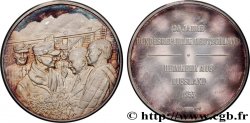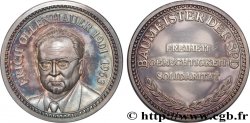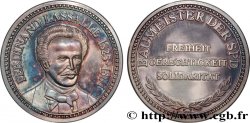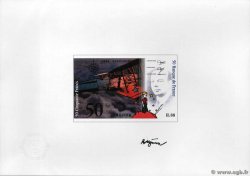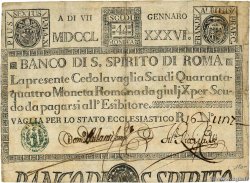fme_1055548 - RÉPUBLIQUE FÉDÉRALE D'ALLEMAGNE Médaille, Kurt Schumacher
50.00 €
Quantità
Aggiungi al carrello

Tipo : Médaille, Kurt Schumacher
Data: n.d.
Nome della officina / città: Allemagne
Metallo : argento
Titolo in millesimi : 999 ‰
Diametro : 40 mm
Asse di coniazione : 12 h.
Peso : 29,57 g.
Orlo : lisse
Marchio : 999
Commenti sullo stato di conservazione:
Patine hétérogène et brillance de frappe. Présence de marques de frottements liées à un nettoyage antérieur notamment au revers, de légères traces d’oxydation et de quelques rayures. La tranche présente des traces de manipulation
Diritto
Titolatura diritto : KURT SCHUMACHER 1895. 1952.
Descrittivo diritto : Portrait de face .
Rovescio
Titolatura rovescio : BAUMEISTER DER SPD // FREIHEIT / GERECHTIGKEIT / SOLIDARITÄT.
Descrittivo rovescio : Légende semi-circulaire et en 3 lignes avec deux branches de laurier. Titrage: 999.
Traduzione rovescio : BÂTISSEURS DU SPD // LIBERTÉ / JUSTICE / SOLIDARITÉ.
Commento
Médaille sous capsule.
Kurt Schumacher fut une figure majeure de la reconstruction politique allemande après la Seconde Guerre mondiale. Fondateur et premier président du SPD (Parti social-démocrate d'Allemagne) dans l'Allemagne de l'après-guerre, il incarna une opposition farouche au nazisme puis au communisme soviétique. Emprisonné pendant plus de dix ans sous le régime nazi, il devint après 1945 le symbole d'une social-démocratie démocratique et antitotalitaire. Schumacher croyait fermement en une Allemagne unifiée, démocratique et sociale. Sous sa direction, le SPD s’opposa au chancelier Konrad Adenauer, notamment sur la question du réarmement et de l’alignement occidental. Il posa les bases d’un SPD moderne, même s’il faudra attendre les années 1960 pour que le parti accède de nouveau au pouvoir.
Medal in capsule. Kurt Schumacher was a major figure in German political reconstruction after World War II. Founder and first chairman of the SPD (Social Democratic Party of Germany) in post-war Germany, he embodied fierce opposition to Nazism and then Soviet communism. Imprisoned for more than ten years under the Nazi regime, he became after 1945 the symbol of a democratic and anti-totalitarian social democracy. Schumacher firmly believed in a unified, democratic, and social Germany. Under his leadership, the SPD opposed Chancellor Konrad Adenauer, particularly on the issue of rearmament and Western alignment. He laid the foundations for a modern SPD, although it would take until the 1960s for the party to regain power.
Kurt Schumacher fut une figure majeure de la reconstruction politique allemande après la Seconde Guerre mondiale. Fondateur et premier président du SPD (Parti social-démocrate d'Allemagne) dans l'Allemagne de l'après-guerre, il incarna une opposition farouche au nazisme puis au communisme soviétique. Emprisonné pendant plus de dix ans sous le régime nazi, il devint après 1945 le symbole d'une social-démocratie démocratique et antitotalitaire. Schumacher croyait fermement en une Allemagne unifiée, démocratique et sociale. Sous sa direction, le SPD s’opposa au chancelier Konrad Adenauer, notamment sur la question du réarmement et de l’alignement occidental. Il posa les bases d’un SPD moderne, même s’il faudra attendre les années 1960 pour que le parti accède de nouveau au pouvoir.
Medal in capsule. Kurt Schumacher was a major figure in German political reconstruction after World War II. Founder and first chairman of the SPD (Social Democratic Party of Germany) in post-war Germany, he embodied fierce opposition to Nazism and then Soviet communism. Imprisoned for more than ten years under the Nazi regime, he became after 1945 the symbol of a democratic and anti-totalitarian social democracy. Schumacher firmly believed in a unified, democratic, and social Germany. Under his leadership, the SPD opposed Chancellor Konrad Adenauer, particularly on the issue of rearmament and Western alignment. He laid the foundations for a modern SPD, although it would take until the 1960s for the party to regain power.








 Segnalare un errore
Segnalare un errore Stampate la pagina
Stampate la pagina Condividi mia selezione
Condividi mia selezione Fai una domanda
Fai una domanda Consegnare / vendere
Consegnare / vendere
 Descrittivo
Descrittivo